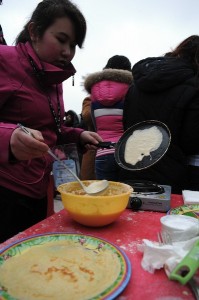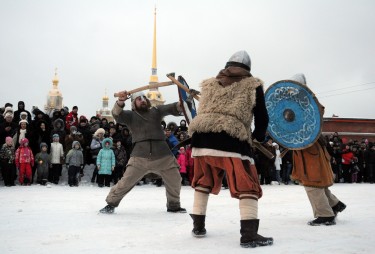Citizen media outlets have captured the multidimensional essence of the Russian Orthodox Lenten season, which began Monday, including issues such the religiosity of post-USSR Russia, the liturgical calendar, the peculiarities of the Orthodox traditions and fasting rituals compared to those observed in the West, and the public statements made by prominent church officials.
Holy Transfiguration Monastery Publications blog contextualizedthe Lenten Triodion among the other three liturgical books recognized by the Russian Orthodox Church:
Four books contain the festal services necessary for the liturgical year.
The Menaion contains the feasts of the Lord, the Mother of God, and the Saints, for every day of the year.
The Triodion contains the services for Great Lent, the three weeks before, and Holy Week.
The Pentecostarion contains the feasts of Pascha through Pentecost and All Saints.
The Octoëchos provides eight one-week cycles of services in one of each of the eight tones.

Pancake week/Maslenitsa celebration in St. Petersburg. Photo by YURY GOLDENSHTEYN, copyright © Demotix (26/02/12).
Irina Bakaeva, a teacher of English from the village of Dergachi in Saratov region, described last Sunday the Russian festivities surrounding “Pancake Week,” which occurs just before the start of Great Lent:
Russia is celebrating Shrovetide, or Pancake week, one of the jolliest, most vivid and fun-filled feasts here.
The tradition of celebrating Shrovetide came to us from pre-Christian Russia. This is a feast of bidding farewell to winter, injected with the joyful anticipation of spring’s arrival, Nature’s awakening and the renewal of life. Shrovetide was the name of a straw effigy, dresses in women’s garments, which was first used in the general merriment, and at the end of the feast – burnt in a bonfire.
An invariable attribute of Shrovetide were pancakes, round in shape – symbolizing the sun, and as such – a ritual dish.
Sophia's bilingual LiveJournal blog discussed last week how the Eastern and Western branches of Christianity observe different traditions in celebrating the beginning of Lent:
Ash Wednesday, in the [Gregorian] calendar of Western Christianity, is the first day of Lent and occurs 46 days before Easter. It is a moveable fast, falling on a different date each year because it is dependent on the date of Easter. It can occur as early as February 4 or as late as March 10.
In Russia we have Clean Monday instead of Ash wednesday, it is also known as Pure Monday, Ash Monday, or Green Monday, is the first day of the Eastern Orthodox Christian and Eastern Catholic Great Lent.
St. Nicholas Russian Orthodox Church blog provides recipes for Lenten Main Dishes, while Orthodox Education Blog includes a link to printable Lenten coloring books for children.

People fight with swords during celebrations of Maslenitsa or Pancake week, a traditional Russian holiday marking the end of winter, St Petersburg. Image by Yury Goldenshteyn, copyright Demotix (26/02/12).
“Why We Were Created” Blog by Catholic Eric Sammons introduced some of the differences between how the Lenten season is celebrated by the Eastern and Western traditions:
The Eastern Lent is similar in intention to the Western Lent, except it is much more severe in practice. [Russian Orthodox Christians] are asked to give up all meat, dairy products and alcohol throughout the entire season (think of that when you are complaining about not eating meat this Friday). They also calculate the days differently than in the West – [Western Christianity does] not count Sundays, whereas [Orthodox Christians] do and they end the counting before Psalm Sunday and consider Holy Week a whole different penitential “season.”
Ancient Faith Radio Blog posted a 15-minute audio recording of Fr. Andrew Damick's discussion on the differences between the Eastern and Western Lenten traditions. In it he emphasized that Orthodox Christians observe lent more as a community and with the assistance of a confessor with the ultimate goal being to become more receptive to God's grace. For Orthodox Christians, he added, Great Lent represents a lifestyle that is merely intensified during this season.
Aleks’ bilingual blog summarized the author's understanding of why fasting is a necessary component of the Christian faith:
I do not know the official teachings of the Orthodox Church regarding fasting, but I'm sure that my views expressed here are not far from the truth. There are a lot of reasons for fasting, but the most obvious to me are (in order of importance):
1. Christians by definition must imitate Christ. Jesus, before starting His Ministry of the Good News, fasted for 40 days. […]
2. Food, and, most importantly delicious, food by itself is a very good thing (trust me, I know). The problem is that its ubiquity has the potential to become the most easily accessible temptation. […] Although I have to mention that not eating is not the essence, the reason, or the purpose of fasting. Physical fast will be useless if we, for example, continue to ignore neighbor's needs, if we continue to swear and be angry, etc. […]
3. Easter is the most important holiday for Christians. Without it there would be no Church, nor the saving Gospel. Therefore, Christians try to prepare for this very special celebration in very special manner. […]
Global Voices introduced Archpriest Vsevolod Chaplin as well as Patriarch Kirill in a January 2012 post entitled, “The Russian Orthodox Church Re-Enters Politics.” Similarly, both men have made public their views on how the Great Lent should be observed by Russians.
While Patriarch Kirill urged Russians to meditate on their own futures as well as the future of Russia, Archpriest Chaplin, according to the Moscow News, said that “people observing lent should refrain from watching talk shows or using online social networks.”
Fr. Oliver Herbel mirrored such thoughts on the importance of moderation in internet usage during Great Lent in a March 2011 post for Pravmir.com blog:
Some in Orthodoxy pride themselves on being “luddites,” that is, as those who are generally against technological progress. This parallels those non-Orthodox Christians in America who see “www” as standing for “666.” On the other hand, some in Orthodoxy, including clergy, are quick to grab the first gadget to hit the market. With regard to the use of the internet, similar patterns may be seen amongst the Orthodox. Some Orthodox will avoid nearly all Orthodox-specific sites or at least any site that dares to address contemporary issues, believing that what matters is only “spiritual” things that can affect one’s soul and that there is nothing one can do to help with current difficulties within the Church. Others will engage any Orthodox site and/or blog and comment frequently, believing that such engagement is contributing to Orthodoxy or sometimes that such engagement is a healthy way to “vent” frustrations. Both approaches to the internet are wrong, even during Great Lent. What is needed is balance.







